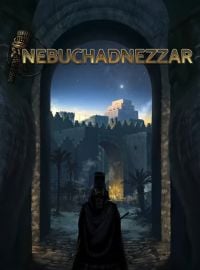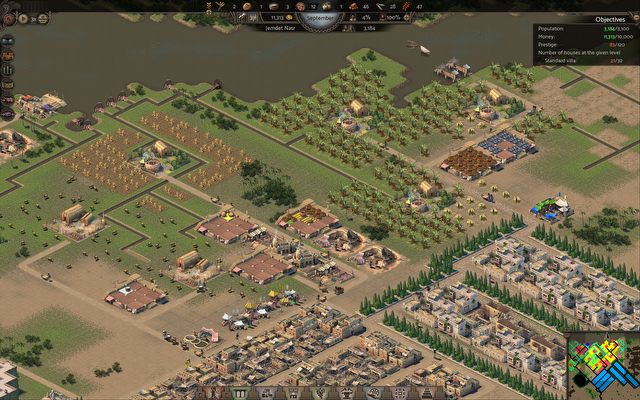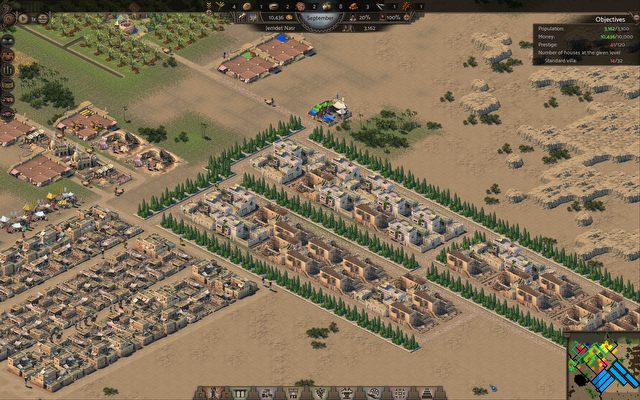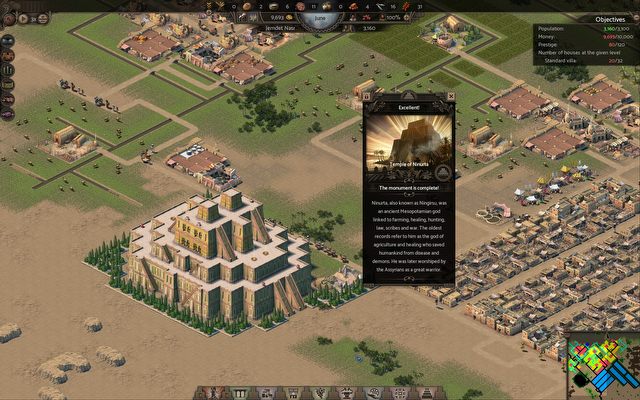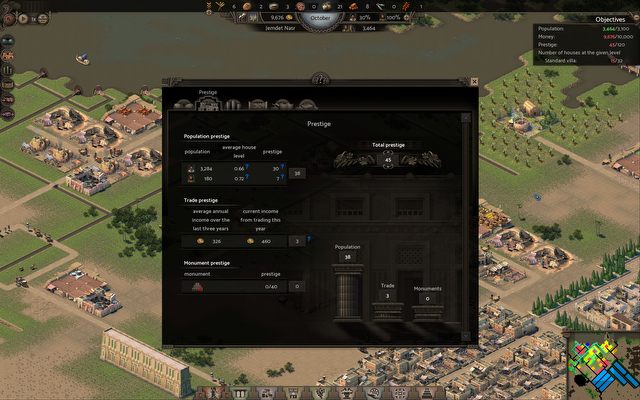Nebuchadnezzar Review - Unremarkable Trip to the Past
Nebuchadnezzar is a good game that brings back memories of Impressions Games' productions like Pharaoh or Caesar. And while it's fun to build a city, Nebuchadnezzar suffers from some serious flaws.
The review is based on the PC version.
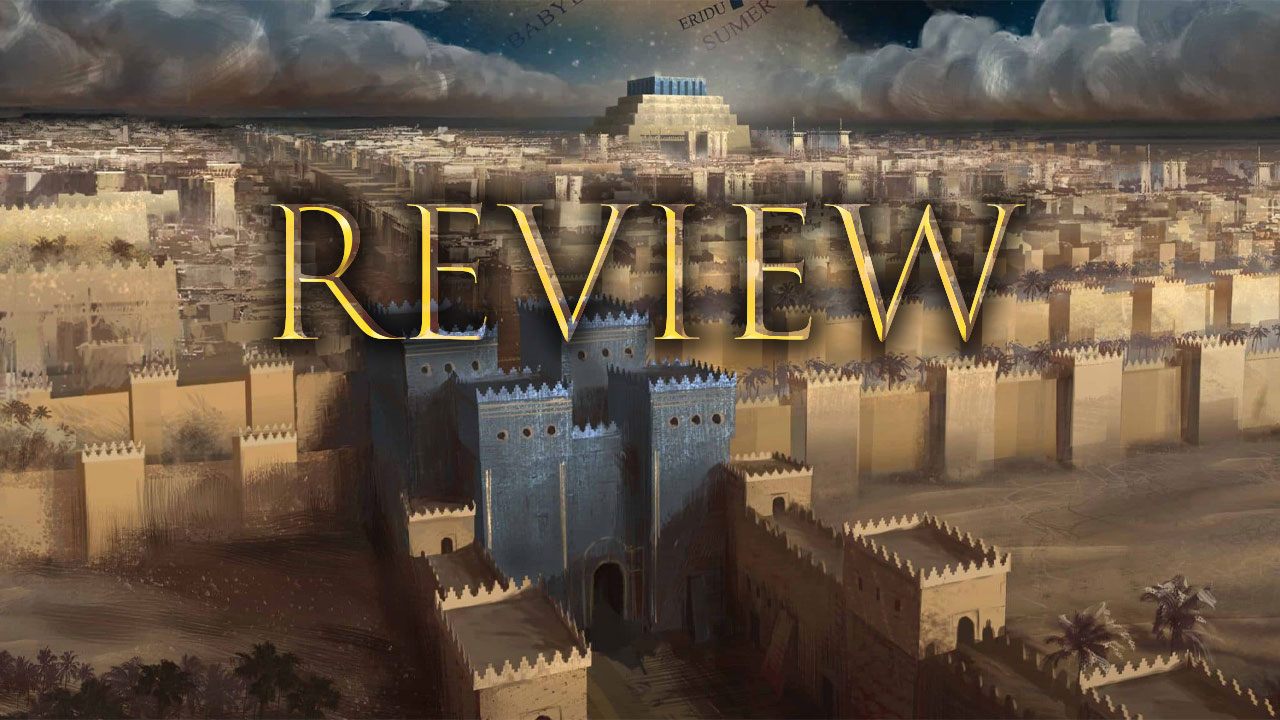
The royal genre of strategy games is back – city-builders that kids don't understand nowadays. Before the era of Cities: Skylines, games like Caesar, Pharaoh and Zeus: Master of Olympus reigned the imagination of gamers. We refer to this sub-genre as "Impressions Games" – a reference, of course, to the legendary progenitors of the genre, active between 1989 and 2004.
- The return of legendary city-builder;
- Building is actually a puzzle;
- Building wonders of the world is fantastic;
- Music!
- No incentives for player;
- No building maintenance;
- No combat and armies;
- No hazards of any kind – nothing will burn, nothing will collapse;
- You can leave your city for hours and it will be in the same condition when you return.
It's been a long time since then – city-builders have gone from being prominent and sought-after games to a niche that few players visit. Sure, the success of Cities: Skylines or Anno 1800 shows that it's still possible to awe the market with a good game based on building cities, but these are high-budget exceptions – beautiful, complex, developed over years. Meanwhile, the games by Impressions Games basically died. Nepos Games, a tiny studio, has made a valiant effort to bring back a great genre, and their Nebuchadnezzar is a good, but not flawless offering. Check out our review to see what works and what doesn't.
Difficult beginnings
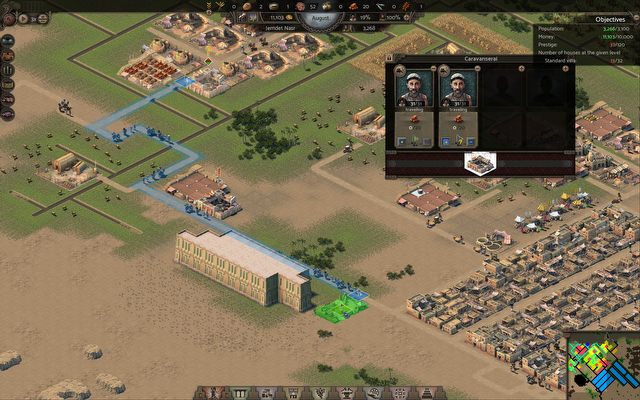
You need to get the right raw materials to the construction site - couriers will come in handy for this. Just set up a route and have fun.
Naba... Neboche... Nobucha... Nebuchadnezzar – which is a game with an extremely difficult name referring to the king of Babylonia, is a game about building the first cities. As in Caesar or Pharaoh, our task is first to build houses for the migrating inhabitants, and then conceiving a whole industry that will give them work, food and various goods. We begin the game by seeing the map from top-down. We erect the first buildings and watch the first settlers populate our homes.
Then we have to take care of food and the basic necessities of life – so we start the production chains of bread, or clay pots, then bricks, beer, etc. The needs of the people increase with development – the number of available buildings grows, while space on the map becomes scarce. As in previous games, the general task is to optimize the space – so that there's enough room for everything and so that the buildings remain within the range of warehouses or markets. It's easy to see that, at later levels, developing a city and satisfying the needs of its increasingly picky citizens becomes more difficult – and that's because of the limited space on the map.
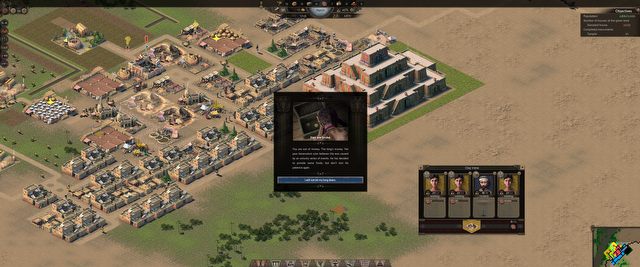
First monument built. So what if my people are starving. The important thing is that we have a great temple!
Games like this are specific puzzles – the solution is to set up buildings and production chains in such a way that everything works smoothly, does not interfere with each other, and allows further development.
For example – if you put a warehouse next to your highly efficient brick-making system, it will be quickly filled. If you want to store foods in the same warehouse as well (say there's a market in its range), there will be no room for them (thus, in short, your residents will not get the needed products required to advance the house). In other words – constantly controlling the placement of buildings is your main concern.
If not, in fact, the only one – unlike its illustrious predecessors, there is no combat system in Nebuchadnezzar – no one will ever attack you, and we don't have to worry about building an army. And while I just love building things myself, it also has some huge drawbacks.
BC-old-school
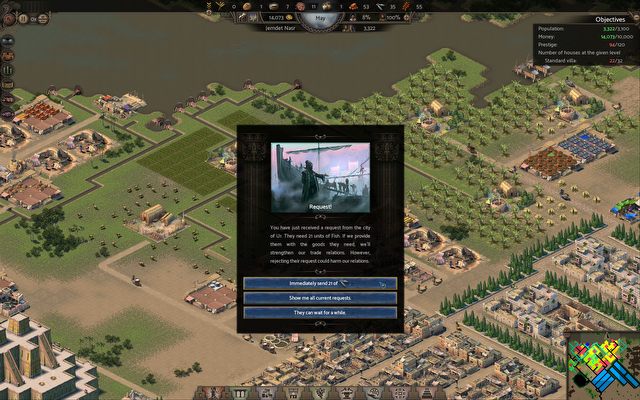
Every now and then the surrounding towns will ask you for something. You can ignore them without much consequence.
The game takes the best elements from its predecessors, and it also resembles them in graphics. The setting is neat, but it's 90s nonetheless. Animated elements are few and rather symbolically indicate that a building is working. The map is ugly – there's only grass (fertile lands possible to sow), desert, or mountains (on which we can't build). That's it.
It's different with music – the developers have prepared a surprisingly satisfying soundtrack that will play throughout the campaign. Really – these songs are great!
Sure, some elements from Pharaoh have been changed – for example, carriers (haulers) delivering goods from markets can be programmed in Nebuchadnezzar so that they visit streets and settlements we order them to. No more of the roadblocks of the past – now, if your buildings still don't want to advance, it may be because you forgot to "draw" the right path for the hauler.
The tribute the developers have paid to the great ancestors will please any fan of old-school. Everything, from the mechanics to the production system and certain relationships between buildings, is transplanted from those beautiful city-builders of yore.
The joy will be relatively short-lived, however, because Nebuchadnezzar has some really powerful flaws. When I went through the 5th mission, I had a strange feeling that I had seen everything. Sure – I got new buildings in subsequent levels, new resources, and in the last 16 missions there's really, really a lot of them and it's hard to wrap your head around it all (especially since the space is not infinite). The problem isn't limited content, but lack of motivation to play. This is because the game has no clear way to motivate the player to keep playing – there is no pressure, there is literally nothing that could wreck your economy.
This is because the game does not have a system of fees for maintaining buildings – unlike all economic games – money never escapes if we don't spend it on buildings. You can have a faulty economy model and leave home for a few hours with the game running – when you return, the city will be in exactly the same state you'd have left it in. Nothing will end, nothing will be lost, and your inhabitants will still be there... Nothing will even burn down or collapse, because the game – unlike the old productions by Impressions Games – doesn't even have disasters or fires. You're building an eternal city, but not in a legendary sense.
At first, I was even happy about it – because I love to just build in peace. However, it soon turned out that since I'm not really in danger, I won't go bankrupt or be raided, my actions are limited to... arranging buildings on the map. That's it. The game adds more buildings and warehouses for me to set up on the map, and think for a moment why things aren't working properly. We complete the dry and boring objectives of each mission (reach a certain population, get enough cash, etc.).
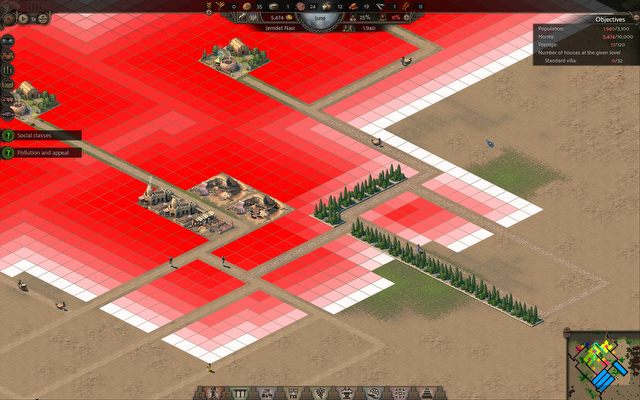
A simple, easy-to-read (and ugly) view of pollution will allow you to assess the state of your city.
The game does have a system of pollution (which decreases the land value, and therefore prevents the advancement of residents) and aesthetics (if you put trees, it's nicer and the value of the land increases). But it's just another piece of the puzzle to keep in mind, not something that will motivate us to keep playing.
It's enough to be a decent game, but it sure doesn't count as living up to a legend, let alone reigniting it.
Wonders and great buildings
However, there's one element which the creators deserve huge praise for. Building large temples that require a lot of labor and resources is phenomenal! You see, once you have erected your slum and provided for the basic needs of your inhabitants, you can set aside space for your great temple. More! You can even design it yourself (admittedly, my self-designed temple was disgusting, so I quickly decided to use the predefined one). You will need hundreds of units of various raw materials (and thus – a thriving economy) to ever get such a building.
What does building a temple give us (besides some fun)? Prestige points, which... are either required to complete a mission (e.g. Earn 1,000 prestige points), or enable us to trade with other cities. That's it. No gods, nor godly whims – forget capricious Zeus. Nebuchadnezzar is all about building for the sake of building, and if that's not enough for you, I'm afraid you'll find nothing of interest in the game.
Still worth it
Yes, it's worth giving Nebuchadnezzar a chance, because no one can take away the joy I had in the first few missions as I tried to get the first production chains up and running, and set up buildings optimally. I invited my girlfriend and she criticized the appearance of my beautiful city – there was plenty of laughter and fun.
But it was only one evening. The other day, when I got past the 5th mission, I discovered that I had seen it all and the game just required more of the same thing – more clicking and time, offering little in return. I was not rewarded for this in any way.
It's a pity, because Nebuchadnezzar in this state will be – I think – merely a curiosity, reaching mostly older fans of city-builders. And the ambition was probably a tad higher than that.
DISCLAIMER
We got the game from the developer – Nepos Games.
Nebuchadnezzar
Nebuchadnezzar Review - Unremarkable Trip to the Past
Nebuchadnezzar is a good game that brings back memories of Impressions Games' productions like Pharaoh or Caesar. And while it's fun to build a city, Nebuchadnezzar suffers from some serious flaws.
